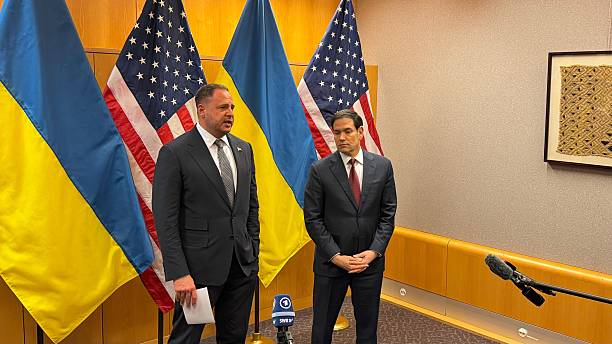What Was Achieved: Optimism in Geneva
During the Geneva talks, U.S. and Ukrainian delegations worked through a proposed 28-point peace plan championed by Washington. Rubio noted that the teams had “gone through some of the items now, point by point,” and said they had narrowed down a number of previously unresolved issues.
Rubio expressed optimism about closing major gaps, though he also emphasized that not all areas of contention have been fully resolved — especially when it comes to security guarantees for Ukraine.
Andriy Yermak, head of the Ukrainian delegation, echoed the positive tone, calling the session “very productive” and reinforcing Ukraine’s desire for a “just and lasting peace.”
The 28-Point U.S. Peace Plan: What’s at Stake
The core of the talks centers on a U.S.-drafted 28-point peace plan that aims to provide a diplomatic framework for ending the war.
Key issues under debate include:
-
Security Guarantees: One of the most sensitive topics is how Ukraine’s security would be guaranteed, potentially involving NATO-like or other formal assurances. Rubio acknowledged that this issue is still being worked out.
-
Territorial Questions: The plan reportedly includes provisions that raise concerns about Ukrainian sovereignty — though the full details remain unclear to the public.
-
Military Size: There is reportedly a proposal to limit the size of Ukraine’s military, a point that has drawn criticism.
Why the U.S. Is Cautiously Optimistic
Rubio described the recent talks as “probably the most productive day we have had on this issue,” noting that the progress reflects days of “accelerated engagement.”
He also characterized the peace plan document as a “living, breathing” text, suggesting that adjustments and refinements are still underway — rather than a fixed offer.
However, Rubio made it clear that the remaining issues are not insurmountable, indicating confidence that a deal could be reached, but warning that it will require more time and negotiation.

Key Challenges & Criticisms
Despite the upbeat tone, several serious concerns remain:
-
Security Guarantees: The nature and enforceability of Ukraine’s future security assurances remain a sticking point. Many in Kyiv and abroad are skeptical about how robust these guarantees will be.
-
Concessions to Russia: Critics argue that parts of the plan could force Ukraine to make significant territorial and military compromises. Some European leaders are reportedly pushing back against what they see as one-sided elements of the proposal.
-
Time Pressure: While progress has been made, Rubio acknowledged that “negotiators just need more time than what we have today.”
-
Sovereignty Risks: There’s concern among analysts that any deal must safeguard Ukraine’s sovereignty and not put it at greater risk in the future.
Why This Matters
If a substantive peace deal emerges, the implications are enormous:
-
Humanitarian Relief: A de facto peace deal could reduce civilian suffering, stabilize frontline regions, and open the door to broader reconstruction.
-
Global Stability: A formal agreement could reset U.S.-Russia relations, ease geopolitical tensions, and restore trust in multilateral diplomacy.
-
Security Architecture: The model of security guarantees offered to Ukraine could redefine how smaller nations are protected in Europe — potentially shaping future alliances.
-
Economic Reconstruction: A formal peace could mobilize massive international investment in Ukraine, rebuild critical infrastructure, and re-integrate its economy.
Expert and Diplomatic Reactions
Reactions to the progress have been mixed:
-
Supporters of the U.S. proposal praise the ambition and note that having a detailed 28-point plan is a concrete step forward.
-
Skeptics worry that the plan gives too much leverage to Russia in exchange for vague promises.
-
European Leaders are reportedly drafting counterproposals, arguing they should have more say in how a peace framework is shaped.
-
Ukrainian Officials continue to emphasize the need for full respect for their sovereignty and strong, enforceable guarantees.
What’s Next?
According to Rubio, the delegations will continue working — refining the plan, making adjustments, and trying to close sticking points.
The draft still needs approval from both the U.S. and Ukrainian Presidents before it can be formally submitted to Moscow.
If talks continue to progress, the next steps could include finalizing the text, garnering international support, and finding a mechanism to guarantee security for Ukraine long-term.
Conclusion
The latest Geneva talks represent a rare moment of constructive diplomacy in a war that has dragged on for years. The United States, under Secretary of State Marco Rubio, is signaling cautious optimism: real progress has been made, but the hardest parts of peace are still ahead.
If successfully negotiated, the 28-point plan could become the foundation of a lasting settlement, balancing Ukraine’s need for security with complex geopolitical realities. But for now, the message from Geneva is clear: progress — yes, but patience and perseverance are essential.




